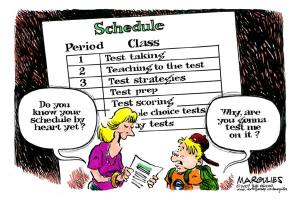Is portfolio assessment effective? In other words, in this world of high-stakes testing and “teaching to the test”, can portfolio assessments prove a useful alternative?
Do authentic assessments, specifically Portfolio Assessment, produce favorable results on standardized tests? For an interesting perspective check out http://educationnext.org/portfolio-assessment/.
We, as idealistic, pre-service teachers want to have alternatives. We are bound by standards at the state and district level, evaluated by student performance on high-stakes tests and are obligated to teach our students facts and concepts. Portfolios provide the opportunity to roll the standards into projects, presentations and reports. The resulting “artifacts” can slide into a portfolio representing the students learning progression and result in student achievement. Portfolios are not without their challenges. Teachers argue that time constraints limit the use of portfolios in the classroom. Educational researchers concede that preparation time can be intense for successful integration, however they argue that students can benefit substantially from the effort.
This blog is an interactive and fluid source for teachers interested in utilizing portfolio assessment in the elementary and secondary classroom. The intention is to provide research justifications for portfolios along with practical applications.


